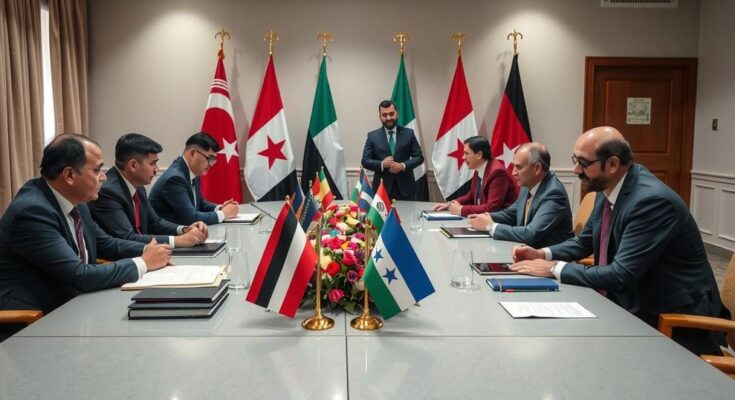U.S., Turkey, and Arab officials convened in Jordan to support a peaceful transition in Syria, emphasizing an inclusive government that respects minority rights and discourages terrorism. Concerns regarding the influence of external powers and doubts about the rebel group’s commitments were raised during discussions.
Officials from the United States, Turkey, and several Arab nations have signaled their commitment to fostering a peaceful transition in Syria following recent discussions held in Jordan. During a press conference in Aqaba, Jordanian Foreign Minister Ayman Safadi emphasized the regional inclination to prevent a descent into chaos within Syria. U.S. Secretary of State Antony Blinken acknowledged the direct communications Washington has had with the rebel group Hayat Tahrir al-Sham (HTS), known for its pivotal role in the uprising against President Bashar al-Assad’s regime.
A collaborative statement highlighted the necessity for an inclusive Syrian government that honors minority rights while ensuring the eradication of terrorist factions. The ongoing discourse regarding Syria’s future has underscored the critical need for governance that embodies unity among the Syrian populace.
Iraqi Foreign Minister Fuad Hussein articulated concerns shared with the broader Middle Eastern community, urging against the emergence of a situation akin to Libya’s post-Gaddafi turmoil. Turkish Foreign Minister Hakan Fidan asserted the importance of preserving and reforming existing Syrian institutions, emphasizing the need to prevent terrorism from exploiting the transitional period.
Despite HTS’s assertions regarding its intent to seek an inclusive governance model, uncertainty lingers due to the group’s historically violent conduct, prompting skepticism regarding its commitments. Secretary Blinken reiterated the U.S.’s ongoing engagement with HTS, particularly concerning the whereabouts of missing American journalist Austin Tice, despite the group’s continued designation as a terrorist organization.
Notably absent from the Jordanian talks were representatives from Syria itself, alongside the key players Iran and Russia, who have historically supported Assad’s regime. The involvement of various external factions has left a significant imprint on Syria’s future, underscoring the necessity for both internal and external harmony amidst efforts to achieve meaningful progress toward freedom and unity for the Syrian people.
The context of the ongoing conflict in Syria involves a complex interplay of local and international powers vying for influence since the uprisings began in 2011. The Syrian civil war has resulted in numerous factions fighting for control, with external players like the U.S., Turkey, Iran, and Russia impacting the dynamics significantly. In light of recent tensions and the changing landscape in the region, discussions have arisen around establishing a government that reflects the diverse makeup of Syrian society while simultaneously countering threats from extremist groups. The focus on a peaceful transition speaks to the broader aims of stability and unity following years of devastation.
In summary, the collective efforts from U.S., Turkish, and Arab officials highlight a commitment to achieving a peaceful resolution in Syria. The discussions underscore the requirement for an inclusive governance framework that respects minority rights while disbanding any terrorist affiliations. However, significant challenges lie ahead, particularly with the ongoing skepticism regarding rebel groups’ intentions and the necessity of external cohesion in order to secure real progress for the Syrian populace.
Original Source: www.bbc.com




